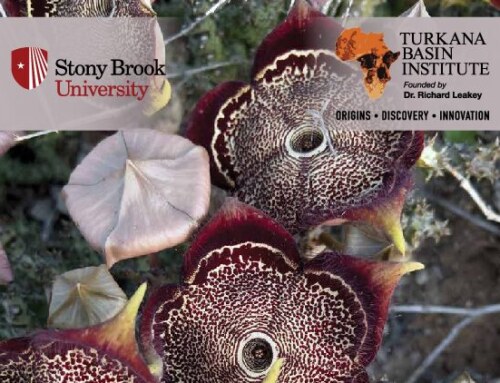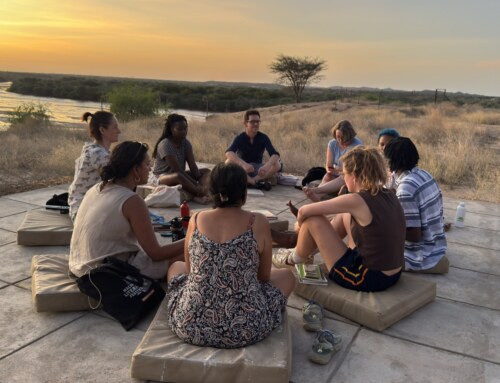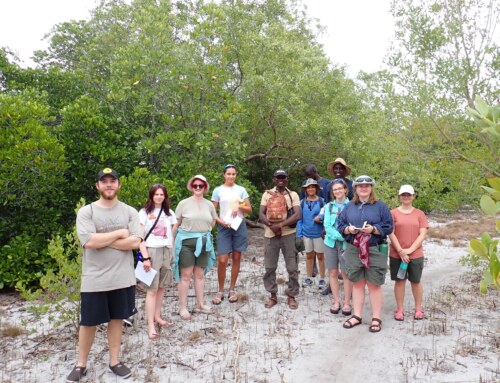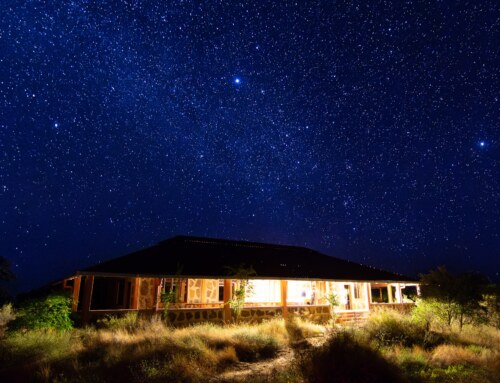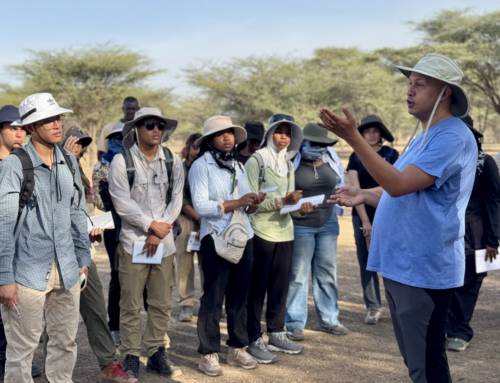The Harvard Summer Program in Kenya commenced on the morning of June 1, 2024 in Nairobi, Kenya. There are 16 students in the program, 9 of whom are Harvard University undergraduates, 1 of whom is a graduate student from China, and 5 of whom are students from Kenya at various stages in their academic careers. Dr. Daniel Green, Teaching Assistants Medina Lubisia and Emmanuel Aoron, and Turkana Basin Institute Chief Operations Officer CJ Jones began Day 1 with a general program orientation, which was followed by the first Swahili lesson of the field school. The students are learning Swahili from Duncan Keshole, who is a language instructor from Kenya. The morning activities were concluded with a lecture about Kenyan history by author Godfrey Sang, who has published ten books on African society, culture, and history.

Daniel Green, Field Program Director, Human Evolutionary Biology, Harvard and Dr Dino J. Martins, CEO of Turkana Basin Institute
That afternoon, the students met Dr. Dino J. Martins, the Chief Executive Officer of the Turkana Basin Institute. He hosted the group in his home for lunch and taught them about butterfly ecology, which is one of his research specialties. Afterwards, the group visited the Hub Mall in Nairobi, where students had the opportunity to pick up any last-minute supplies for the coming weeks. The night was spent at the Wildebeest Eco Camp in Nairobi.
Day 2 began at 8:30 AM with a lecture on wildlife by two staff members from the Kenya Wildlife Service. Around 11:00 AM, the group left for a visit to the Sheldrick Wildlife Trust’s Nairobi Nursery at the Nairobi National Park, where they were able to interact with a herd of baby elephants who had been orphaned and who are being rehabilitated by the Trust. In the afternoon, the students visited the National Museum of Kenya and saw a number of its collections. The night was again spent at the Wildebeest Eco Camp.


On the morning of the third day, the group packed up and headed to Naivasha, which is about 2 hours north of Nairobi. They had lunch soon after their arrival at the Ajabu House on Lake Naivasha, and spent much of the afternoon doing readings. The first assignment of the class – 2 to 3 bullet points for each assigned reading – was due that afternoon at 3:00 PM. The night was spent at the Ajabu House.
The morning of June 4th was spent exploring Lake Naivasha by boat. In the afternoon, Dr. Green led an in-depth discussion on Darwin’s On the Origin of Species, which at this point the students had read eight chapters of. That evening, there was a two-page essay due on the book. Students could pick one of three prompts to address:
- Is Darwin’s On the Origin of Species still relevant today?
- In Darwin’s view, is evolution more driven by climate or competition?
- What is the greatest weakness of Darwin’s argument?


After a second night at the Ajabu House, the group packed their bags and headed out for the Mpala Research Centre on the morning of June 5th. The drive is about 5 hours long, and on the way they stopped at Nanyuki, which is the closest town to the research center and is just over a mile north of the equator. At Nanyuki the group had lunch and another discussion of Darwin’s On the Origin of Species before arriving at Mpala around 5pm. The Mpala Research Centre is an organization located on the slopes of Mount Kenya that looks for ways that humans and animals can sustainably coexist. After a 3:00 PM discussion about safety at Mpala by Dr. Green, Emmanuel, Medina, and two Mpala staff members, the group had dinner and went to bed.
Day 6 began with a Swahili lesson led by Duncan Keshole, and then Dr. Martins rejoined the group on June 6th to give a talk about local ecology. After lunch, the group and Dr. Martins went on a hike to a nearby hill. On June 7th, the students went on a game drive through Mpala with Dr. Martins, and after lunch, they saw more of the local Mpala animals and learned how ranchers take care of them. Dr. Martins gave a lecture about the African Savannah on June 9th after the students had Swahili, and in the afternoon the group went on a drive to learn more about local ecology – specifically, ants and grasses. June 9th was a rest day, with an optional Swahili discussion table over chai in the morning.
The main subjects covered in the program’s first week included ecology, earth systems, and infectious diseases. These topics prepared students to have a deeper understanding of the local environment, both urban and rural, and prepared them for the subsequent week, which would focus more on the spread of diseases and feature lectures by infectious disease specialist Dr. Jon Epstein and Kenya wildlife expert Dr. Edward Kariuki.

Dr Dino Martins and Daniel Green with the students at Mpala Research Centre

